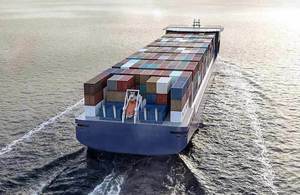£2.4 million funding to support seafarers’ mental wellbeing
Developing projects to improve conditions in the maritime sector.

- £2.4 million allocated for projects to support seafarers’ mental wellbeing and the maritime sector
- government has partnered with 3 organisations across the UK to deliver pilot projects to provide everyday support for seafarers’ wellbeing and mental health
- comes as the Maritime Minister launches the new recovery route map, setting out the actions to help the sector recover from the effects of the pandemic
Maritime Minister Robert Courts has announced government funding for 3 organisations to support projects developing seafarers’ wellbeing and maritime skills, diversity and careers.
Announcing the news at the Mersey Maritime Exchange in Liverpool, the minister also outlined how the funding will support a review of ‘ratings’ training. This will include roles such as deck, engine room, hospitality and catering in the maritime industry. It will be carried out by the Maritime Skills Commission.
£2.4 million will help to support green skills, alleviate seafarer mental health issues and work towards the maritime 2050 ambition to widen the diversity of the sector.
The funding aims to support the maritime sector to create a highly skilled, well-supported workforce that people from all backgrounds want to join.
As recognised in the government’s Maritime 2050 report and brought into sharp focus during the coronavirus (COVID-19) pandemic, seafarers’ welfare and mental health remains a serious issue. These challenges have exposed a need to better understand welfare issues for seafarers and the paucity of facilities and other support available when needed.
Maritime Minister Robert Courts said:
Seafarer wellbeing is at the heart of our Maritime 2050 agenda and we know that mental health difficulties at sea affect thousands of seafarers. We are committed to tackling this and building a diverse, highly skilled and exciting sector across the board – from shipbuilders to bosuns.
This funding will help us tackle this problem by supporting the excellent work being done by charities and social organisations and fostering new programmes.
I am also pleased to be launching our recovery route map, which will help to build a resilient, innovative and future-facing maritime sector for generations to come.
A package of 9 seafarer protection measures, announced in March, has already set out plans to establish a new framework to improve the long-term working conditions of seafarers, developed in consultation with industry and unions.
The UK has continued to be a leading voice in recognising existing rights and working with industry and seafarer welfare organisations. In addition, the industry has developed mental health awareness training which is delivered to every new seafarer as part of their mandatory training. This funding aims to raise the profile and enhance delivery of successful programmes – small, large, new and existing – to champion seafarer rights.
Also launched today (23 June 2022) is the government’s Maritime recovery route map. This brings together the government’s plans to help the sector recover from the impact of the pandemic while supercharging delivery of Maritime 2050. The report was developed jointly with industry. It follows the key Maritime 2050 themes including how we will support our outstanding workforce, stay competitive and drive green growth by delivering innovation and new technology.
Stuart Rivers, Chief Executive Officer of the Merchant Navy Welfare Board, said:
This significant investment in the maritime charity sector is both timely and extremely welcome. The maritime charities sector has been supporting seafarers through multiple crises over the past 2 years, despite the difficult fundraising conditions. Department for Transport’s funding will provide a real boost to seafarers’ welfare and enable improvements in skills and diversity for the wider sector.
The funding will support maritime skills, diversity, careers and seafarer wellbeing, with £230,000 of the funding allotted to Maritime UK to support green skills, a ratings review and drive forward careers and diversity plans and a further £140,000 to Ormiston Maritime Academy to promote maritime in schools in key target areas for regional growth.
Ben Murray, Chief Executive Officer of Maritime UK, said:
To realise the vision that we have for the UK maritime sector in 2050, we need the best people from all backgrounds to offer new thinking on the big issues of our age. That means being an inclusive sector, one that invests in its people and prepares for the future.
Maritime UK is delighted that people and skills are at the heart of the government’s maritime recovery route map and the industry is determined to accelerate its work on priorities like diversity and green skills.
Rachel Kitley, Principal of Cowes Enterprise College, which is part of Ormiston Academies Trust (OAT), said:
Our Maritime Futures initiative fulfils the educational aspirations of the government’s Maritime 2050 strategy. It seamlessly integrates robust disciplinary knowledge with hands-on maritime projects, raises awareness of the maritime sector and provides students with meaningful encounters with maritime employers.
We are thrilled that funding from Department for Transport will enable us to disseminate this model at pace, particularly in coastal communities. Simultaneously, Maritime Futures will contribute to raising attainment for students in disadvantaged areas and raise the profile of the maritime industry.
Maritime media enquiries
Media enquiries 020 7944 3021
Out of hours media enquiries 020 7944 4292
Switchboard 0300 330 3000